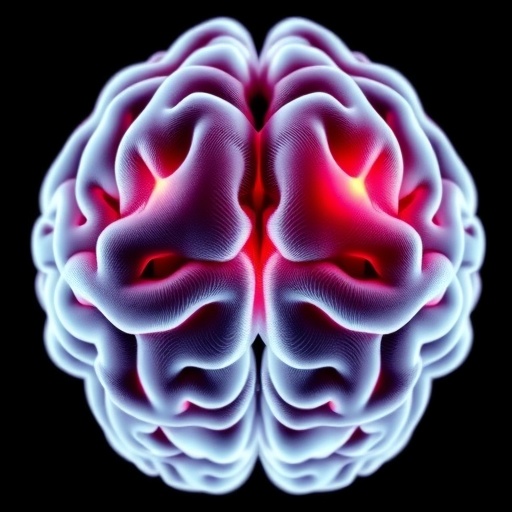In the realm of age-related health research, a significant study has emerged, shedding light on the relationship between brain changes as detected by standard head computed tomography (CT) scans and the results of cough tests. Conducted by a team of researchers led by R. Murase, the investigation’s findings were published in BMC Geriatrics. As the global population ages, understanding how the brain changes over time and how these alterations impact various physiological responses is crucial for geriatric care. This research could pave the way for new insights into the management of age-related conditions.
The study itself explores an important topic that has far-reaching implications for healthcare. It examines the connection between observable alterations in the brain due to aging—an inevitable process—and the effectiveness of cough tests. Cough tests are a simple yet potent tool used in identifying various neurological and respiratory conditions, which often manifest differently in older adults. The researchers aim to bridge the gap between nuanced brain imaging results and practical clinical assessments, presenting a holistic view of geriatric health.
In conducting their research, the team utilized a sample of older adults, each undergoing both CT scans and cough tests. The CT scans, a staple in medical diagnostics, provided a visual representation of the brain’s structural changes, such as white matter lesions and atrophy, which are common in the elderly. By correlating these findings with the cough test outcomes, the researchers sought to identify patterns that might indicate declining neurological function or vulnerabilities in respiratory health, a combination that frequently affects the elderly population.
What makes this study particularly compelling is its potential to revolutionize how clinicians approach geriatric assessments. Traditionally, evaluations have been focused solely on individual symptoms or diagnostic tests in isolation. However, integrating detailed imaging data with functional tests like the cough assessment offers a more comprehensive understanding of an individual’s health status. This holistic perspective could lead to better-targeted interventions aimed at preserving both cognitive and respiratory function in aging patients.
Furthermore, the implications of this research extend beyond mere academic curiosity. As populations around the world continue to age, healthcare systems find themselves under increasing strain, necessitating innovative solutions. Understanding how brain alterations correlate with other health markers can potentially enhance early detection of complications, guiding clinicians in developing preventive measures before conditions become critical. This proactive approach could significantly improve the quality of life for many elderly individuals.
The authors of the study also emphasize the role of technology in modern geriatric medicine. With advances in imaging techniques and data analysis, the ability to discern subtle brain changes and their impact on bodily functions has never been more achievable. The study’s findings underscore the importance of utilizing advanced imaging technologies alongside traditional assessments, creating a multidimensional approach to patient care.
Moreover, the researchers highlight the significance of ongoing education for healthcare providers. As the field of geriatric medicine evolves, practitioners must remain informed about the latest findings related to aging, brain health, and comprehensive assessment techniques. This knowledge empowers clinicians to make better-informed decisions, ultimately leading to improved patient outcomes.
However, like any research, this study also faces certain limitations. The sample size, while representative, may not encompass the full diversity of the aging population. Variations in health background, lifestyle, and comorbidities play a pivotal role in how aging manifests in individuals. Therefore, further studies involving larger, more diverse groups will be essential in confirming these preliminary findings and their applicability across different demographics.
As discussions surrounding aging and brain health become more prevalent, it also opens up a dialogue about the stigmas associated with aging and cognitive decline. Public perception of aging often leans towards negative stereotypes; however, research like this challenges those narratives by highlighting the complexity and variability of aging. It encourages a richer understanding of how individuals can maintain their health and wellbeing even as they grow older.
In conclusion, the research conducted by Murase and colleagues marks a significant step forward in the understanding of aging and its connection to brain health and respiratory function. By integrating imaging techniques with practical assessments like cough tests, this study lays the groundwork for future explorations into comprehensive geriatric care. As the health landscape continues to evolve, the insights gained from this study could lead to groundbreaking advancements in how we support the elderly, ensuring that they not only live longer but thrive as they age.
Maintaining a focus on brain health, enhancing public awareness, and fostering an environment that promotes ongoing research are vital components of addressing the complexities associated with aging. The road ahead is filled with opportunities, and studies like this pave the way for innovative approaches to managing the health of an aging population.
As we look to the future, it becomes clear that the fusion of technology and medicine will play a critical role in shaping the next generation of healthcare practices. The link between aging, brain health, and physiological responses highlights a pivotal area of research that must be prioritized as we strive to improve the quality of life for older adults globally. Indeed, the quest for knowledge and understanding in this field is not merely academic; it holds the key to unlocking a healthier, more vibrant future for generations to come.
Subject of Research: The relationship between age-related changes in the brain and cough test results in elderly individuals.
Article Title: Relationship between age-related changes in the brain detected by plain head computed tomography and cough test results.
Article References:
Murase, R., Nakane, A., Omosu, Y. et al. Relationship between age-related changes in the brain detected by plain head computed tomography and cough test results.
BMC Geriatr 25, 772 (2025). https://doi.org/10.1186/s12877-025-06379-6
Image Credits: AI Generated
DOI: 10.1186/s12877-025-06379-6
Keywords: Age-related changes, brain health, computed tomography, cough test, geriatric care.




